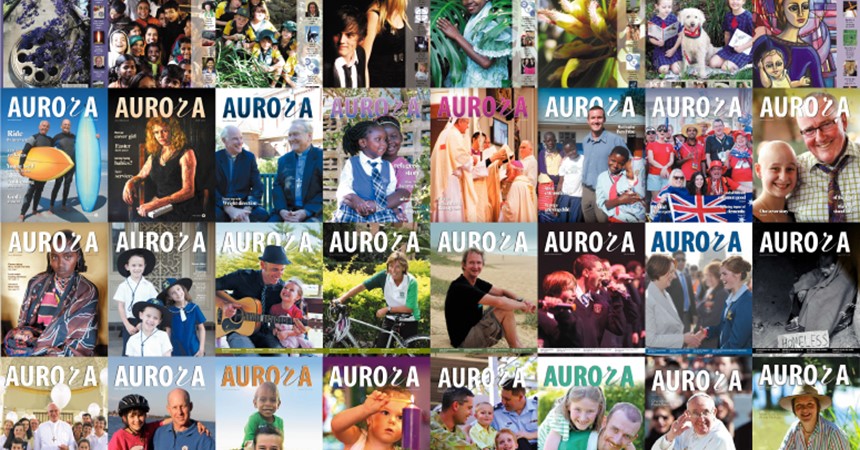Q&A with Aurora Editor, Tracey Edstein.
What do you love most about being Aurora editor?
I love the opportunity to tell our people’s stories. So many individuals are doing wonderful work, professionally and voluntarily, and Aurora is a window to it all. When I hear, often ‘second hand’, the impact of an Aurora story, it’s so gratifying. Jewish philosopher Elie Wiesel wrote that God made us because God loves stories. I believe we are all made in the image and likeness of God, and so we all love stories!
What makes Aurora unique?
A year ago Aurora won the Bishop Philip Kennedy Memorial Award for Overall Excellence – the highest accolade of the Australasian Catholic Press Association – and the Gutenberg Award – the Australasian Religious Press Association’s premier award. I believe one of the reasons for this is Aurora’s model of distribution. The diocese takes seriously the injunction, “Go into the whole world and proclaim the gospel…” (Mark 16:15). Because Aurora is distributed monthly through six regional newspapers, its audience is arguably the broadest of any Australasian religious publication.
Each edition brings so much energy and variety in contributors and content, where do you get story ideas and source so many excellent writers?
The stories published in Aurora reflect the variety of ways in which members of the community are engaged in schools, parishes, community organisations, workplaces and neighbourhoods. The editorial team – Trish Bogan, Michael O’Connor, Shirley McHugh,
Monica Scanlon and Joanne Isaac – and the diocesan Communications Team – are gifted individuals who are generous in their commitment. I appreciate too the many phone calls and emails from people with story ideas or comments. Aurora relies very much on support from its community.
What are some of the achievements from the last 150 issues?
In April 2014, Aurora highlighted the need for the CatholicCare Nightcare Van to be upgraded. Within a few months, a brand new, superbly outfitted van graced the cover of Aurora, thanks to the community’s unstinting generosity.
Edition 100, March 2011, was the first to be distributed through newspapers. When it was announced at a diocesan gathering that this would happen, there was spontaneous applause. The local media has often, and rightly, called the church to account, and yet the community was ‘big’ enough to support an unprecedented move to the secular press.
Aurora today has a very different look and feel from the original edition. How has the magazine changed?
Aurora was ‘born’ as a tabloid newspaper in December 1996, under the editorship of Fr Peter Brock. In June 2006 the move to a smaller, full colour magazine was made. This gave way in 2011 to the large format, gloss magazine that is now familiar. However, the most important development has been the change in style necessitated by reaching out to a broad audience. There is now an opportunity to inform so many people of the church’s teachings, practices and stances, in ways that are engaging and inviting. So often, the issues explored in Aurora are ‘water cooler’ issues of general interest. As editor, I am constantly trying to ensure that the magazine’s content doesn’t assume knowledge of, or commitment to, the church. When an assumption creeps in, a reader will let me know!
The media-scape has changed greatly since 1996. How has Aurora adapted to the digital world?
While many say they still prefer to read Aurora in hard copy, there are other options. Aurora appears online on the diocese’s news site, mnnews.today and has a social media presence.
What’s a favourite Aurora memory?
Many years ago now, I phoned a family home to pursue a story. A young girl answered and I explained who I was. She then put the phone down and I heard her call out, “Muuuum, it’s the Aurora lady!” I am delighted, and privileged, to be “the Aurora lady”.




























































































